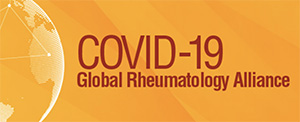Rheumatology Global Alliance – Our community’s unprecedented rapid response to the COVID-19 pandemic

With an estimated 330 million Twitter users worldwide, it’s not surprising that discussions to create a global rheumatology registry started on this social media platform. What is surprising? The speed with which international rheumatologists collaborated and launched the Global Rheumatology Alliance (GRA). On March 24, just 12 days after the idea for a registry was first conceived in a tweet, the GRA went live.
Inspired by gastroenterologists who were developing a registry of COVID-19 patients with Inflammatory Bowel Disease (SECURE-IBD), the initial 12-member rheumatologist group sought to create a large open registry for all patients with rheumatic illness who contract the virus. According to Dr. Philip Robinson, Chair of the GRA, little information was available from previous coronavirus epidemics—those caused by severe acute respiratory syndrome-1 (SARS-1) and Middle East respiratory syndrome (MERS). Information around outcomes, risk and severity of infection for people with rheumatic diseases when they become infected with COIVD-19 was absent. The urgency to address this deficit was clear.
Conversations to develop the global rheumatology registry moved from Twitter to Slack, an online collaborative messaging platform allowing users to chat in real-time, and Zoom, the cloud-based peer-to-peer software platform used for teleconferencing. Within the first week, over 250 members joined and participated in the Slack channel, generating over 4000 messages, and almost 100 documents. Going quickly forward, a website was established. Leads were appointed for information technology, administration, organizational liaison and media, literature review, and registry development. A steering committee was also formed with patients forming an essential part of the team.
The mission of the Global Rheumatology Alliance is to collect, analyze and disseminate information about COVID-19 and rheumatology to patients, physicians and other relevant groups to improve the care of patients with rheumatic disease. Their vision is to bring together the global rheumatology community to curate and disseminate accurate and comprehensive knowledge to advance rheumatology care in the COVID-19 pandemic.
At the time of writing, 336 organizations worldwide officially support the Alliance and nearly 2,000 cases of individuals with rheumatologic disease and COVID-19 have been entered into the dataset in 6 continents. More than 9,500 patients have responded to the COVID-19 patient survey. This is an unprecedented global collaboration for unprecedented times.
Visit the GRA website for more information, to enter the COVID-19 Provider Registries, Patient Experience Survey and view data.
Related:
- Dr. Diane Lacaille - COVID-19 Global Rheumatology Alliance (video)
- Dawn P Richards: Covid-19 is bringing unpredictability and fear to the rheumatology community
- Putting patients at the centre of COVID-19 research: Emily Sirotich’s involvement in a global alliance gave people with rheumatic diseases a driving seat in shaping research on how COVID-19 is affecting them.
- Global Rheumatology Alliance registry delivers 'reassuring' data, dispels COVID-19 myths
- Date modified: